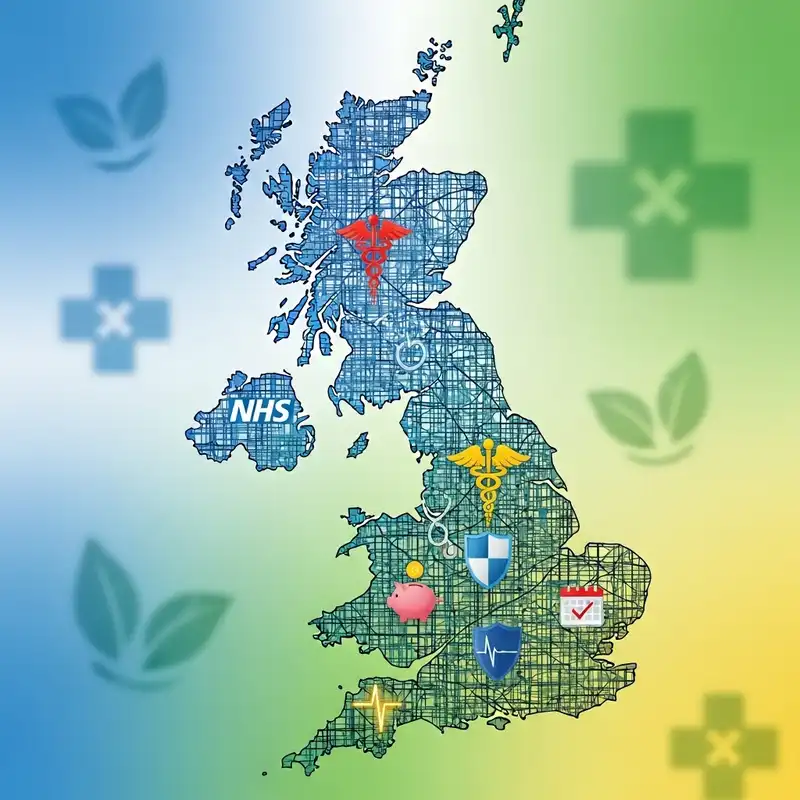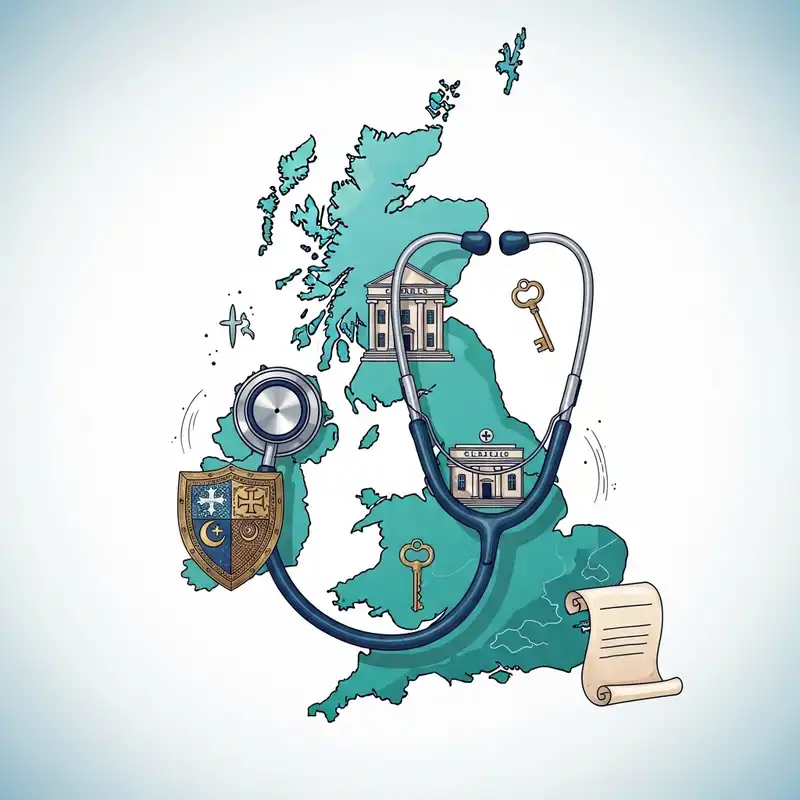TL;DR
We live in a golden age of self-improvement. We track our steps, optimise our sleep, meditate with apps, and fill our refrigerators with organic, nutrient-dense foods. We invest time and money in our physical and mental well-being, striving to become the best versions of ourselves.
Key takeaways
- Optimism Bias: We naturally believe that "it won't happen to me." We see statistics about illness but subconsciously exclude ourselves from them.
- Fear and Avoidance: Thinking about serious illness or death is uncomfortable. It's easier to put our heads in the sand and focus on more immediate, positive goals.
- Perceived Complexity: The world of insurance can seem daunting, filled with jargon and confusing options.
- Cancer (illustrative): Cancer Research UK projects that 1 in 2 people in the UK born after 1960 will be diagnosed with some form of cancer during their lifetime.
- Heart and Circulatory Diseases: The British Heart Foundation reports that these conditions cause more than a quarter of all deaths in the UK.
Beyond Self Care the Unseen Shield for Your Best Life
We live in a golden age of self-improvement. We track our steps, optimise our sleep, meditate with apps, and fill our refrigerators with organic, nutrient-dense foods. We invest time and money in our physical and mental well-being, striving to become the best versions of ourselves. Yet, amidst this flurry of personal development, a foundational pillar of resilience is often completely overlooked: our financial security.
The hard truth is that life is unpredictable. A sudden illness or accident can derail even the most meticulously planned life, not just physically and emotionally, but financially. The stress of worrying about your mortgage, bills, or family's future while trying to recover can be debilitating. This is where a proactive approach to financial protection transforms from a simple insurance policy into the ultimate act of self-care. It's the unseen shield that allows you to face life's challenges head-on, knowing you have a safety net in place.
This guide will illuminate how a robust protection strategy isn't about planning for the worst; it's about empowering you to live your best life, free from the heavy anchor of financial anxiety.
The Great Disconnect: Why We Nurture Our Bodies But Neglect Our Finances
The wellness industry is booming. We readily spend on gym memberships, yoga retreats, and superfoods. This is fantastic – investing in our health is one of the best things we can do. However, there's a profound disconnect. While we focus on our physical resilience, we often ignore the financial resilience that underpins it all.
Consider this: according to the Money and Pensions Service, millions of adults in the UK have little to no savings, and a significant portion feel anxious about their financial situation. This persistent, low-level stress can be just as damaging to our health as a poor diet or lack of exercise. It gnaws at our peace of mind and distracts us from our goals.
Why do we do this?
- Optimism Bias: We naturally believe that "it won't happen to me." We see statistics about illness but subconsciously exclude ourselves from them.
- Fear and Avoidance: Thinking about serious illness or death is uncomfortable. It's easier to put our heads in the sand and focus on more immediate, positive goals.
- Perceived Complexity: The world of insurance can seem daunting, filled with jargon and confusing options.
It’s time to reframe this conversation. Building a financial safety net is not a morbid exercise. It's a profound act of love for yourself and your family. It’s about building a fortress of security so that if a storm does come, the life you've worked so hard to build remains standing strong. You wouldn't build a beautiful home on shaky ground; your financial plan is the bedrock upon which you build your life.
The Core Components of Your Financial Shield: A Deep Dive
A comprehensive protection plan is not a single product but a combination of different types of cover, each designed to protect you from a different risk. Think of it as a multi-layered shield, with each layer providing a specific form of defence.
Life Insurance: The Cornerstone of Legacy
Life insurance is perhaps the most well-known form of protection. At its core, it pays out a sum of money upon your death, providing a financial lifeline for your loved ones. This isn't for you; it's for them. It ensures that their lives can continue with financial stability at the most difficult of times.
There are several key types:
| Type of Life Insurance | How It Works | Best For |
|---|---|---|
| Level Term Assurance | Pays a fixed lump sum if you die within a set term (e.g., 25 years). The payout amount never changes. | Covering an interest-only mortgage or providing a set inheritance for your children. |
| Decreasing Term Assurance | The potential payout decreases over the term, usually in line with a repayment mortgage. It's cheaper than level term. | Protecting a repayment mortgage, ensuring the debt is cleared if you pass away. |
| Whole of Life | Guarantees a payout whenever you die, as long as you keep paying the premiums. It's more expensive. | Covering a guaranteed Inheritance Tax bill or leaving a planned legacy. |
| Family Income Benefit | Instead of a lump sum, it pays out a regular, tax-free monthly or annual income until the end of the policy term. | Young families who need to replace a lost monthly salary to cover ongoing living costs. |
Choosing the right type depends entirely on your circumstances. A family with young children might find the regular payments of Family Income Benefit more manageable than a large, one-off lump sum.
Critical Illness Cover: Your Financial First Responder
While life insurance protects your family after you're gone, Critical Illness Cover is designed to protect you and your family while you're living. It pays out a tax-free lump sum if you are diagnosed with one of a list of specified serious conditions.
The statistics here are sobering:
- Cancer (illustrative): Cancer Research UK projects that 1 in 2 people in the UK born after 1960 will be diagnosed with some form of cancer during their lifetime.
- Heart and Circulatory Diseases: The British Heart Foundation reports that these conditions cause more than a quarter of all deaths in the UK.
- Stroke: There are more than 100,000 strokes in the UK each year – that's around one stroke every five minutes.
A critical illness diagnosis is devastating enough without the added burden of financial worry. The payout from a policy can give you breathing space, allowing you to focus completely on your recovery. You could use the money to:
- Clear or pay down your mortgage.
- Cover lost earnings for you or a partner who takes time off to care for you.
- Pay for private medical treatments not available on the NHS.
- Make adaptations to your home, such as installing a ramp or a stairlift.
- Simply remove financial stress, which is a critical part of any recovery journey.
Policies typically cover a wide range of conditions, but the main ones are usually cancer, heart attack, and stroke. Many comprehensive plans now cover 50+ conditions, including multiple sclerosis, kidney failure, major organ transplant, and Parkinson's disease.
Income Protection: Your Monthly Salary When You Can't Work
For most working people, their income is their single most valuable asset. It pays for everything. So what happens if you can't work for a long period due to illness or an accident?
This is where Income Protection (IP) comes in. It is arguably the one policy every working adult should consider.
How it works: If you're unable to do your job due to any medical reason, after a pre-agreed waiting period (the 'deferred period'), the policy starts paying you a regular, tax-free monthly income. This continues until you can return to work, the policy term ends, or you retire, whichever comes first.
Many people mistakenly believe the state will support them. Let's be clear: Statutory Sick Pay (SSP) in the UK for 2024/25 is just £116.75 per week, and it's only paid for a maximum of 28 weeks. For most people, this is a fraction of what's needed to cover essential outgoings. (illustrative estimate)
| Your Financial Safety Net | Monthly Payout (Approx.) | Duration |
|---|---|---|
| Statutory Sick Pay (SSP) | £506 | Up to 28 weeks |
| Typical Income Protection | £1,875 (on a £3,000/m salary) | Until you recover or retire |
As the table shows, the difference is stark. Income Protection is a robust, long-term solution. It's particularly vital for those in physically demanding jobs like tradespeople (electricians, plumbers, builders), healthcare professionals (nurses, dentists), and anyone who is self-employed and has no access to employer sick pay whatsoever. Some policies are specifically branded as Personal Sick Pay insurance, often offering shorter-term payment periods (1, 2, or 5 years) which can be a more affordable option for those in high-risk occupations.
The Power Duo: Combining Protection with Private Medical Insurance (PMI)
While protection policies provide the financial support during a health crisis, Private Medical Insurance (PMI) provides the medical support. The two work together in perfect synergy to create a truly comprehensive shield.
PMI, also known as private health insurance, pays for the cost of private healthcare, from diagnosis to treatment. Its primary benefit in the current climate is speed. With NHS waiting lists reaching record levels – figures from NHS England frequently show millions of people waiting for routine treatment – PMI allows you to bypass these queues.
Let's illustrate with a scenario:
Meet Mark, a 45-year-old graphic designer. Mark develops persistent stomach pains.
- Without PMI: Mark sees his GP. He's referred for a consultation with a specialist, which has a 6-month wait. After the consultation, he's put on another waiting list for a diagnostic scan, which takes a further 4 months. The total time to get a diagnosis is almost a year.
- With PMI: Mark sees his GP, who refers him to a private specialist. He gets an appointment within a week. The specialist refers him for a scan, which happens two days later. He has a diagnosis and a treatment plan within two weeks.
Now, let's add his protection policies into the mix.
- Illustrative estimate: Mark is diagnosed with a type of cancer that is covered by his Critical Illness Cover. He receives a £100,000 lump sum. He uses this to pay his mortgage and bills for the next year, meaning he can take a complete break from work.
- His PMI covers the cost of his surgery at a private hospital, his chemotherapy treatment with an oncologist of his choice, and even specialist therapies to manage side effects.
- Because he has Income Protection, if his recovery takes longer than his one-year break, his policy will kick in to continue providing a monthly income.
This combination removes both the medical and financial stress, allowing Mark to dedicate 100% of his energy to getting better.
For the Trailblazers: Protection for the Self-Employed and Business Owners
If you run your own business or work for yourself, you are your company's greatest asset. The traditional safety nets of employer sick pay and death-in-service benefits simply don't exist. This makes a personal protection strategy not just advisable, but absolutely essential.
The Freelancer & Self-Employed Lifeline
For the UK's millions of freelancers, contractors, and sole traders, a bout of ill health can be catastrophic. If you don't work, you don't get paid.
- Income Protection is non-negotiable. It's the direct replacement for a corporate sick pay scheme.
- Critical Illness Cover provides a capital injection to keep you and your business afloat during a serious health event.
- Life Insurance ensures your family is not left with business debts or a sudden loss of income.
Shielding Your Business: For Company Directors
For those running a limited company, there are sophisticated, tax-efficient ways to arrange protection through the business itself. This not only protects you and your key people but can also offer significant tax advantages.
| Business Protection Type | What It Does | Why It's Crucial |
|---|---|---|
| Key Person Insurance | The business takes out a policy on a key individual. If that person dies or suffers a critical illness, the business receives the payout. | The funds can be used to cover lost profits, recruit a replacement, or repay a business loan, ensuring business continuity. |
| Executive Income Protection | An income protection policy paid for by the company, for an employee (often a director). It's a legitimate business expense. | Highly tax-efficient. Protects the director's income and shows the company values its leadership. |
| Shareholder Protection | Provides a lump sum to the remaining shareholders, allowing them to buy the shares of a deceased or critically ill shareholder. | Prevents shares from passing to a family member with no interest in the business, avoiding boardroom conflict and ensuring a smooth transition. |
Arranging cover through your business can be a powerful strategy. At WeCovr, we have extensive experience helping directors and business owners navigate these specialist policies, ensuring they are structured correctly for maximum benefit and tax efficiency.
Advanced Strategies: Legacy, Gifts, and Tax Planning
Financial protection extends beyond just income and health. It's also a powerful tool for legacy planning and managing Inheritance Tax (IHT).
One of the most effective but lesser-known tools is Gift Inter Vivos insurance.
In the UK, when you give away a significant gift of assets (e.g., property or cash), it is known as a Potentially Exempt Transfer (PET). If you live for 7 years after making the gift, it falls outside of your estate and is completely exempt from IHT.
However, if you die within those 7 years, the gift becomes chargeable to IHT on a sliding scale. This can create an unexpected tax bill for the person who received your gift.
A Gift Inter Vivos policy is a specialised form of life insurance designed to solve this problem. It's a term assurance policy that runs for 7 years, with a decreasing payout that mirrors the decreasing IHT liability. If you die within the 7-year window, the policy pays out to cover the exact IHT bill, ensuring your gift is received in full by your loved ones. It’s a clever way to ensure your generosity doesn’t create a future tax burden.
Beyond Insurance: Cultivating Everyday Resilience
While having the right financial shield is critical, it should go hand-in-hand with a lifestyle that promotes health and well-being. The two are intertwined; a healthier lifestyle may reduce your risk of making a claim and can sometimes lead to lower insurance premiums.
The Pillars of Well-being
- Nourish Your Body: A balanced diet rich in fruits, vegetables, whole grains, and lean proteins is fundamental. It's not about restriction, but about fuelling your body and mind effectively. Small changes, like swapping processed snacks for fruit or nuts, can have a big impact.
- Prioritise Sleep: Sleep is not a luxury; it's a biological necessity. Aim for 7-9 hours of quality sleep per night. It's when your body repairs itself, consolidates memories, and regulates hormones. A consistent sleep schedule is key.
- Move Every Day: You don't need to run a marathon. Regular, moderate activity—a brisk 30-minute walk, a cycle ride, a yoga class—boosts your mood, improves cardiovascular health, and strengthens your immune system.
- Manage Stress: Chronic stress is a silent killer. Incorporate stress-management techniques into your day. This could be mindfulness, deep breathing exercises, spending time in nature, or simply dedicating time to a hobby you love.
At WeCovr, we believe in a holistic approach to well-being. Our commitment goes beyond finding you the right policy. That's why, in addition to our expert advice, we also provide our clients with complimentary access to our AI-powered calorie tracking app, CalorieHero. It's a simple, effective tool to help you make informed choices and support your personal health and wellness journey, perfectly complementing the financial security we help you build.
Putting It All Together: Your Personalised Protection Blueprint
There is no "one-size-fits-all" solution when it comes to financial protection. The right strategy for you depends on your age, health, job, family circumstances, and financial goals.
Let's look at a few examples:
-
The Young Family (The Patels) (illustrative): Aisha (32) and Ben (34) have a £250,000 repayment mortgage and two children under 5. Their priority is ensuring the family would be secure if one of them were no longer around.
- Blueprint (illustrative): A joint Decreasing Term Assurance policy for £250,000 to clear the mortgage. A Family Income Benefit policy to provide a monthly income until their youngest child is 21. Each has a modest Critical Illness Cover policy to provide a financial cushion in case of serious illness.
-
The Self-Employed Tradesperson (Dave the Electrician): Dave (42) is a sole trader. He has no employee benefits. If he can't work, his income stops immediately.
- Blueprint: A robust Income Protection policy with a short deferred period (e.g., 4 weeks) is his absolute priority. It will pay him a monthly income if any injury or illness stops him from working. He also has a small life insurance policy to cover his funeral costs and leave something for his partner.
-
The Company Director (Priya): Priya (50) is the founder and MD of a successful tech company. She is vital to its operation, and she also draws a significant income from it.
- Blueprint (illustrative): A personal Whole of Life policy written in trust to help her children with a future IHT bill. Through her company, she has Executive Income Protection and a £1 million Key Person policy to protect the business if she were to fall seriously ill.
Navigating these options and tailoring them to your life can feel complex, which is why working with an expert broker is invaluable. At WeCovr, we specialise in helping you analyse your needs and build this personalised blueprint. We take the time to understand you, your family, and your business, then compare policies from all the major UK insurers to find the perfect combination of cover at the most competitive price.
Conclusion: The Ultimate Freedom
For too long, we've viewed insurance as a grudge purchase—a necessary evil focused on negative outcomes. It's time to change that perspective.
Proactive financial protection is one of the most positive, empowering, and forward-looking decisions you can make. It's not about dwelling on what could go wrong; it's about creating the security and peace of mind that allows you to focus on everything that can go right.
It is the freedom from the nagging "what if" anxiety. It is the freedom to pursue your career, grow your business, and invest in your personal development, knowing that your foundations are secure. It is the freedom to be fully present with your loved ones, creating memories without a shadow of financial fear.
In 2025 and beyond, let's redefine self-care. Let's build true resilience from the ground up. By creating your unseen shield of protection, you are not just managing risk—you are unlocking your potential and building a lasting legacy of peace and security for yourself and everyone you care about.
How much cover do I actually need?
Is this kind of insurance really expensive?
Will I need to have a medical examination to get cover?
What is the main difference between Income Protection and Critical Illness Cover?
- Critical Illness Cover pays out a one-off, tax-free lump sum if you are diagnosed with a specific serious illness defined in the policy. It's designed to provide a capital injection to deal with the immediate financial impact of a diagnosis.
- Income Protection pays a regular, tax-free monthly income if you are unable to work due to any medical reason (illness or injury). It's designed to replace your salary over the medium to long term.
Can I get protection if I have a pre-existing medical condition?
Why should I use a broker like WeCovr instead of going direct to an insurer?
- Whole-of-Market Access: WeCovr can compare policies from all the major UK insurers to find the best cover at the best price, saving you time and money.
- Expert Advice: We help you understand the different types of cover and build a personalised plan tailored to your unique needs, ensuring you don't buy too much or too little cover.
- Application Support: We guide you through the application process and can help if there are complexities, such as medical conditions.
- Trust Expertise: We can provide invaluable assistance in placing your policy in trust, ensuring the payout goes to the right people quickly and without being subject to Inheritance Tax. This is a service often overlooked when going direct.
Sources
- Office for National Statistics (ONS): Mortality and population data.
- Association of British Insurers (ABI): Life and protection market publications.
- MoneyHelper (MaPS): Consumer guidance on life insurance.
- NHS: Health information and screening guidance.

































